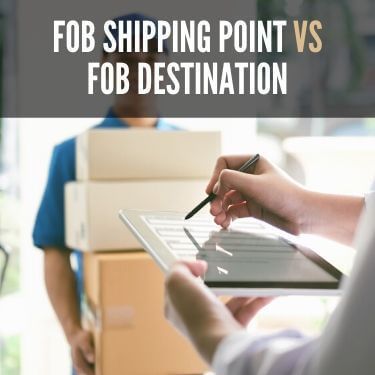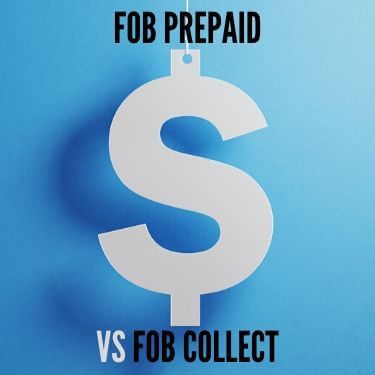If you’re new to the world of shipping or receiving freight via ocean, you’ll need to be able to find an answer to this question: What Does FOB Mean in Shipping? All cargo shipments transported via ocean are designated with specific FOB terms. The nature of these terms have important legal consequences if there happens to issues with cargo such as loss or damage.
So, what does FOB mean in shipping? In the world of shipping, the term FOB stands for free on board. The terms that are included along with FOB determine when ownership of the goods changes hands. FOB terms also state when payment is collected for a shipment. Knowing the different FOB combinations is important for businesses shipping and receiving freight.
In the article below, we’ll explore FOB terms in detail to provide you with all of the information you need when shipping and receiving freight.
The International Chamber of Commerce, (ICC) is the organization responsible for defining FOB and many other terms related to international trade. These terms are found within the Incoterms, which is an abbreviation for international commercial terms. Incoterms were first established in 1936 with just 6 terms, FOB being one of them. The latest copy of the complete Incoterms is available for purchase through the ICC’s website.
When negotiating a freight contract, it’s important to identify exactly when the ownership of the goods being shipped transfers. FOB shipping point, sometimes referred to as FOB origin, states that the ownership of goods transfers from the seller to the buyer at the point shipping or origin point.
Conversely, FOB destination means that the buyer only becomes responsible for the freight when it arrives at its destination. Often, arrival at a specified port is classed as the freight’s destination. However, a buyer and seller can negotiate these terms. Depending on the specific contract, the freight’s destination, in relation to liability issues, can be at the buyer’s premises or at a particular location en route to the buyer’s location.

It’s important to note, however, that the term FOB in shipping can have different meanings. Technically, the ICC definition doesn’t imply that ownership of the fright is necessarily transferred at the time at which the buyer takes responsibility for the goods.
However, in practice, many contracts do stipulate that ownership is transferred at this point. In fact, FOB is widely used in the United States to refer to the exact time transfer of ownership occurs, despite the fact that the technical ICC definition doesn’t stipulate this.
Similarly, the term FOB in shipping is commonly used to imply that the seller is not responsible for the shipping cost. Although the buyer does often assume responsibility for shipping costs when an FOB contract is drawn up, this isn’t always guaranteed. Instead, the terms Freight Collect and Freight Prepaid are used to identify who is responsible for payment of a shipment.
In reality, FOB in shipping only usually becomes important if a problem arises or when parties are in disagreement about who should pay the shipping costs. If an order is incomplete or freight is damaged in transit, the FOB terms will determine whether the buyer or seller is legally responsible. Due to this, it’s essential to negotiate each contact carefully to determine:
Although FOB shipping point is often used to imply that the ownership of the freight transfers from the seller to the buyer at the origin of the shipment, this must be stated on the bill of lading.
The terms freight prepaid and freight collect are used to specify whether the shipper or receiver is responsible for payment. However, these terms are often used alongside FOB in shipping. As international shipping uses a range of standards and contractual terms, it’s important to understand the terminology and what it means for you.
If a shipment is noted FOB prepaid, it means that the seller pays for the cost of shipping. When shipments are FOB collect, the buyer is responsible for freight charges. These terms, in conjunction with shipping point and destination, dictate financial and legal responsibility for goods shipped via ocean.
Of course, neither party to a contract generally want to pay for shipping costs. If you can negotiate a contract so that the other party shoulders the burden of shipping fees, it can reduce your costs and be advantageous for your business. Buyers can even negotiate lower rates for goods if they agree to an FOB Shipping Point, Collect.

When negotiating freight shipping services, there are various ways the terminology can be used. Often, an agreement might be made to send goods FOB Origin Prepaid, for example. This means that the buyer effectively owns the shipment at the point it is picked up by the carrier, but the seller is responsible for safety and cost of the shipment.
Alternatively, FOB Origin, Freight Collect means that the buyer pays for shipping, as well as being responsible for the safety of the cargo en route. As FOB Origin has been specified, the buyer essentially takes on ownership of the goods at the point they are picked up by the carrier too.
When you’re shipping freight, it’s vital to understand the exact terms of your contract. Whether you’re arranging a shipment, awaiting delivery or shipping hazardous materials, FOB terms are an important aspect that shouldn’t be overlooked.
Of course, whether you’re paying for the cost of shipping or are legally responsible for the goods while they’re being transported to states like California, you’ll want to ensure they arrive in perfect condition. It’s essential, therefore, that you use a reliable freight company to handle your shipments.
R+L Global Logistics is a world-class logistics and transportation company with the knowledge and experience to handle any shipment. Whether you need a simple shipment across town or multiple international shipments that require warehousing, fulfillment, and more, we can handle it.
When you’re ready to ship, give us a call at (866) 353-7178 or click get a quote below. Our transportation and logistics experts are standing by ready to help you.
R+L Global Logistics
315 NE 14th St., Ocala, FL 34470